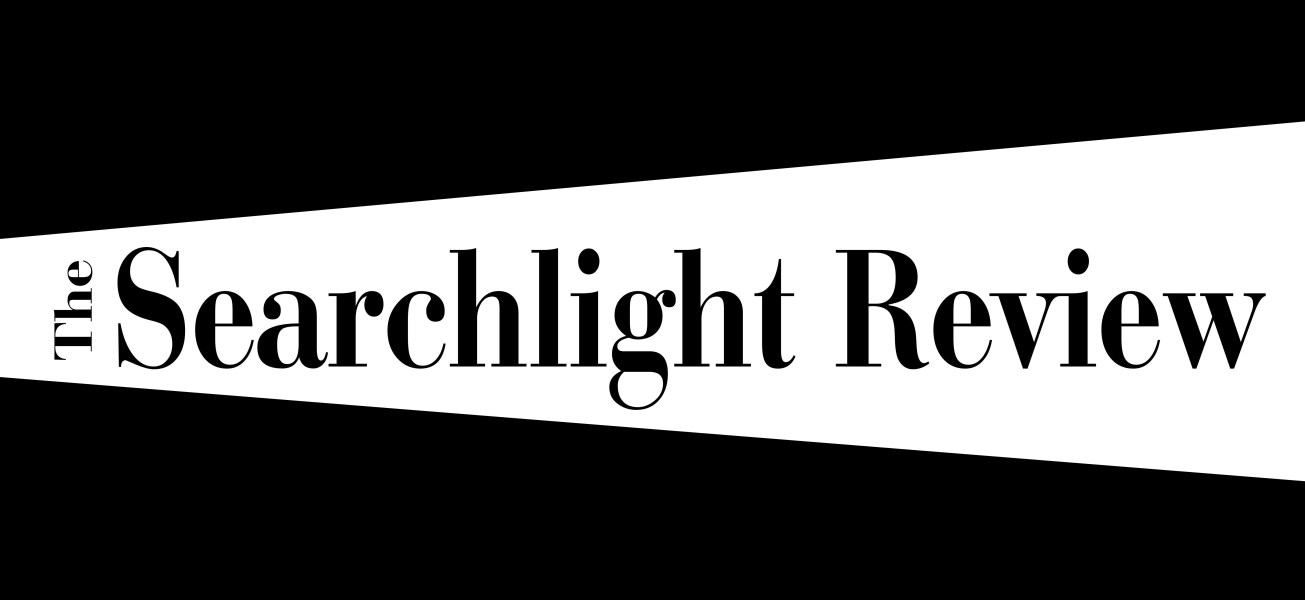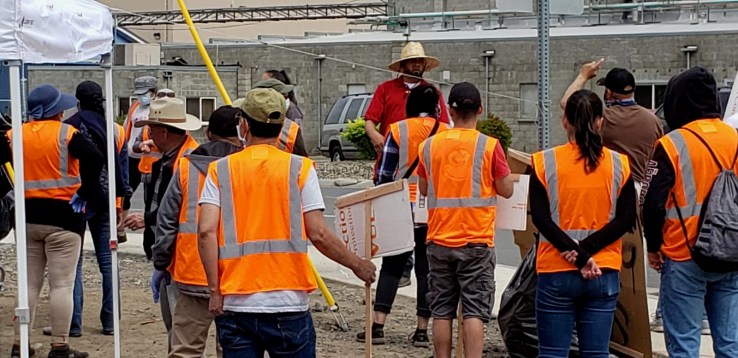- Photo taken on May 11, 2020, showing Familias Unidas por la Justicia president, Ramon Torres meeting with striking Allan Bros. workers. Photo credit: Brenda Bentley
By Sandy Robson
May 24, 2019
Workers at Allan Bros., Inc., a century-old apple grower, packer and shipper located in Yakima County, Washington, have been on strike since May 7, 2020, when more than 50 workers walked off the job.

According to a May 7 article published by the Yakima Herald-Republic, the striking workers expressed concerns about what they said was the company’s lax response to the coronavirus, and they are demanding increased transparency from the company regarding COVID-19 cases, improved safety and sanitation procedures, along with requesting hazard pay and paid time off without needing to use personal time.
The strike followed the news earlier this month that Yakima County, with a population of only approximately 250,000, reportedly has the highest rate of COVID-19 cases on the West Coast. The Yakima Health District website’s most recent data summary, updated on May 24, 2020, at 4:30 PM, shows there have been 2,965 confirmed cases of COVID-19, and 84 deaths due to COVID-19 in Yakima County. As of Friday, May 22, the Yakima Health District listed that there were 19 employees from Allan Bros. with COVID-19.

Over the last two weeks, workers at six other Yakima County fruit packing houses and growers had also walked out. Columbia Reach, Frosty Packing Co., Roche Fruit, and Hansen Fruit and Cold Storage in Yakima; and Matson Fruit Co. and Monson Fruit Co. in Selah. Workers at these other companies have been making similar demands such as the workers have at Allan Bros., as well as demanding paid sick leave and protection from retaliation.
Staff and/or members of Familias Unidas por la Justicia, an independent farm worker union based in Burlington, Washington, and Community to Community Development, a Bellingham, Washington-based ecofeminist, community-building, immigrant and farm labor advocacy organization, are among several groups which have been providing support to the striking workers.
As the strike by numerous workers at Allan Bros. continues, there have been some communications between management and a worker group/committee.
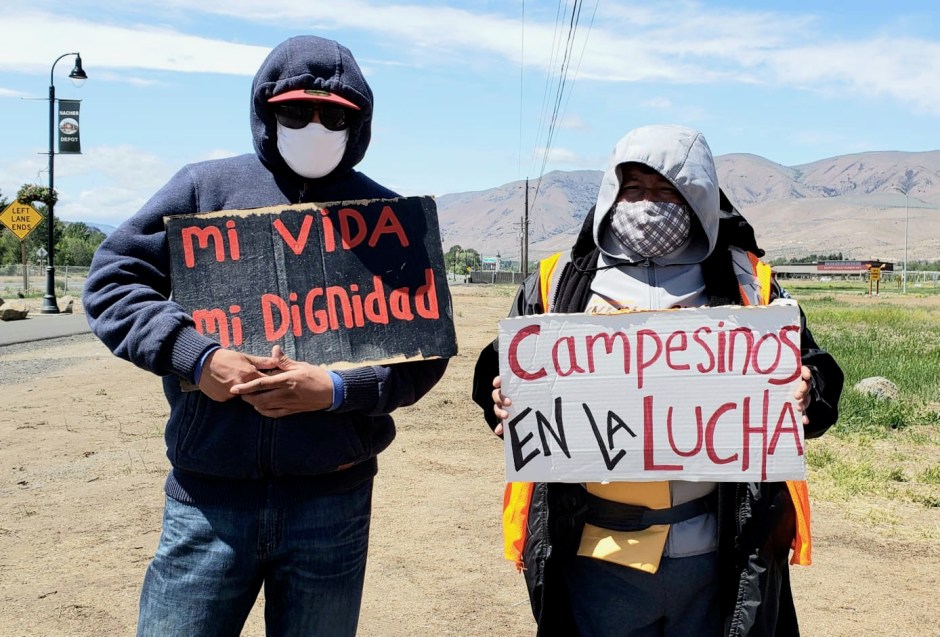
According to a May 15, Yakima Herald-Republic article, a worker group at Allan Bros. met with management on Thursday, May 14. At that time, Allan Bros. reportedly offered a $1 per hour raise for seven weeks, and the group rejected that offer.
Allan Bros. CEO Miles Kohl, told the Yakima Herald-Republic, according to its May 12 article, that “the company is looking into how it can provide additional compensation that would not negatively impact the company’s financial well-being.” He said that apple prices have been falling and the company has reduced its production rate as a result of social distancing measures it implemented, which has impacted the revenue the company is able to generate. Kohl added, “You want to pay every employee more money. We have to consider that, however, with the constraints we have in the broader economy and the tree fruit industry.”
Allan Bros: A big company in a small town
According to dnb.com (Dun & Bradstreet), the estimated annual revenue of Allan Bros., Inc. is approximately $50,000,000.
Public records obtained recently by The Searchlight Review from the Yakima Health District (“the Health District”), included a map of the Allan Bros. property located in Naches, a small city of approximately 840 residents. The text underneath the map describing the company and its layout reads:
“Allan Brothers, Inc. is a conventional and organic apple, and cherry, packing and storage facility situated in one covered building (2 apple packing lines, and 2 cherry packing lines) with a total square footage of 303,000 located in Naches, Washington, on approximately 89 acres of fenced in property with gated entry and access points. There are three satellite cold storage CA [controlled atmosphere] facilities, AB2, AB3, and Roy Farms in Moxee, Washington, located within 3 and 20 miles respectively from the packinghouse.
“Approximately 515 full-time employees working two shifts, and an additional 400 seasonal employees for the cherry season (which lasts from June to August) operate the facility with an additional 16 to 30 people on the clean-up sanitation crew. The four packing lines (Hybrid, PPL, Dark Sweet Cherry, and Rainer Cherry) are housed in one large covered building 177,000 square feet are dedicated to controlled atmosphere storage which are sealed rooms with low oxygen levels. There is a separate shipping Department with docks and storage, a new office facility located across the street from the facility, and a separate shook storage area that is a large tented area with pest control. Currently we have added a new kitchen and lunchroom for our employees and offices for Managers and IT Dept.”
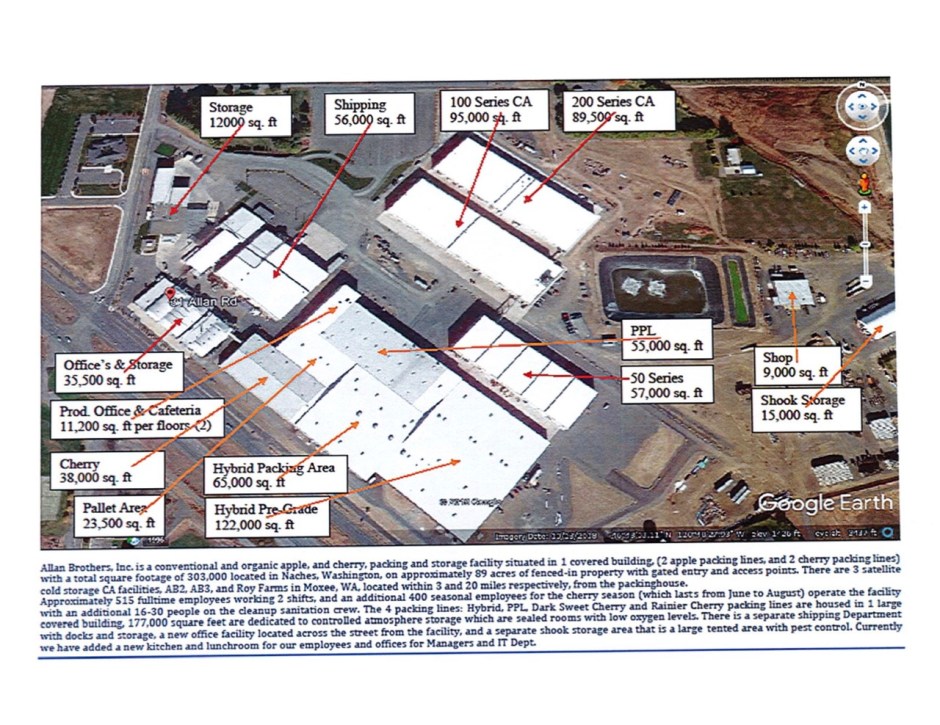
That 303,000 square-foot packing and storage facility was in the news two years ago, when a January 2018, Capital Press article reported: “Allan Bros. Inc., a small tree fruit company with more than century-old roots, is building a new $40 million apple packing facility managers say they need to remain competitive. Construction of the 300,000-square-foot storage and packing facility began last [in 2017] March. It will be operational by the end of October, said Miles Kohl, company CEO.”
It’s difficult to think of Allan Bros. as a “small fruit tree company” when the company’s financial capabilities allowed it to spend $40 million for a new apple storage and packing facility.
Besides being a fruit grower and packer, Allan Bros. also owns vineyards. In April of 2014, Allan Bros. ventured into the wine industry when it acquired Sagemoor Vineyards, 883 acres of wine grapes located north of Pasco, Washington, according to an April 10, 2014 article published on greatnorthwestwine.com. The article reported that, “Sagemoor Vineyards sells grapes to about 70 wineries, ranging from producers who make just a few hundred cases all the way up to Ste. Michelle Wine Estates, which has been purchasing grapes from Sagemoor since the beginning.”
Approximately two years later, Sagemoor Vineyards owned by Allan Bros., purchased Gamache Vineyards, a 180-acre vineyard located in Basin City, Washington, according to a January 27, 2016, article published on greatnorthwestwine.com.
Workers continue strike and stakes are raised
On Tuesday, May 19, more than 30 Allan Bros. workers continued their walkout, and two workers started a hunger strike, according to a May 19, Yakima Herald-Republic article.

Mystica items placed to honor two hunger strikers who work at Allan Bros. who began a hunger strike on May 19. Photo credit Brenda Bentley
Raising the stakes even more for striking workers, was a frightening incident that had reportedly occurred recently and was subsequently reported by KAPP/KVEW TV in a May 19, article. The article reported that, according to court documents, striking Allan Bros. workers were standing along the side of Allan Road, across the street from Allan Bros.’ warehouse, when a man driving on the road stopped and yelled, “I am going to get my 50-caliber gun and come back and shoot you all.”
Yakima County Sheriff’s Office deputies were called to the property and were there when the man returned, driving an ATV, and the man was recognized by a detective as 58-year-old Stacey Sedge, according to KAPP/KVEW TV’s May 19 article. The article also reported that deputies said Sedge admitted to driving through the area and having made the threat, but he told deputies he had not meant it, and that he didn’t have any guns. Sedge was arrested and reportedly was charged.
The Searchlight Review spoke to an assistant in the prosecutors office on May 21, and confirmed that the incident involving Stacey Sedge, reported by news outlets last week, occurred on Thursday, May 14, and he is charged with felony harassment and malicious harassment, and that the arraignment is scheduled for May 29.
Health District records regarding its May 8 site visit to Allan Bros.
Back when the strike at Allan Bros. had started on May 7, the article published that same day by the Yakima Herald-Republic reported that workers said, “the company isn’t being transparent about COVID-19 cases and has been lax on safety measures, such as facility cleaning.”
Records obtained by The Searchlight Review from the Health District show that its agency received a complaint on March 26, 2020, from a person who said, according to someone they know who works at Allan Bros., the company was not practicing social distancing or healthy practices.
Email records obtained show that the Health District’s environmental health director, Shawn Magee, sent an April 17 email to Allan Bros. CEO Miles Kohl, informing him that the Health District was investigating a cluster/potential outbreak of COVID-19 (Novel Coronavirus) in the company’s facility. Magee told Kohl that it was important that they speak as soon as possible “to discuss how we can best help limit the spread of this virus in your facility.”
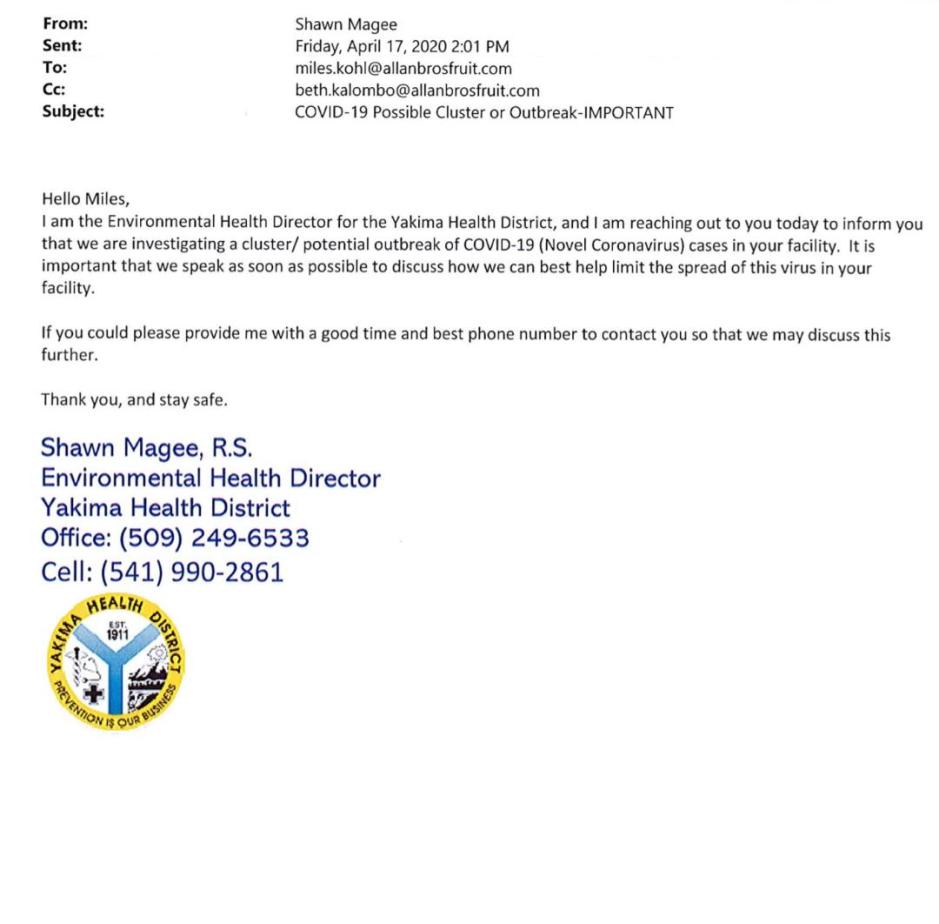
According to email records, Kohl responded in an email later that same afternoon, and a conference call between the Health District and Kohl was scheduled for that evening. He said that the company’s human resource director and the compliance director would join him on that call.
In the records obtained from the Health District there was a 1-page document labeled “Allan Bro’s” that, according to Ryan Ibach, the agency’s chief operating officer who is also the agency’s public records officer, are notes that the Health District’s environmental health specialist, Beth Snider, had typed up after a May 8 site visit/consultation conducted at Allan Bros.

When asked why the notes were typed up after the site visit/consultation and about the fact that there were no written field notes taken during the site visit/consultation released to The Searchlight Review, Ibach said in an email that the environmental health specialist who conducted the site visit/consultation said she did not take written field notes during the consultation, but typed up the notes afterwards.
The first line of the notes stated that the “Facility [Allan Bros.] wanted a site visit due to their employees going on strike and [an] article being published in the newspaper.”
That was the article published on May 7 by the Yakima Herald-Republic, reporting that 50 workers at Allan Bros. had walked off that same day, “voicing concerns about the company’s response to the coronavirus.”
According to the notes document, Allan Bros. had “12 confirmed cases of COVID-19.” While the notes described a number of preventative measures that the company had in place, the notes also stated:
“They [Allan Bros.] do not currently have facemasks but do have face shields. They haven’t distributed them [face shields] to anyone yet. They were planning to but did not get to it before the strike happened.”
The date of the Health District’s site visit/consultation at Allan Bros., May 8, was over one month after the Centers for Disease Control and Prevention announced on April 3, that in light of new evidence that a significant portion of individuals with the novel coronavirus who are asymptomatic and pre-symptomatic can transmit the virus to others before showing symptoms, its agency recommends wearing cloth face coverings in public settings where other social distancing measures are difficult to maintain especially in areas of significant community-based transmission.
It was also stated in the notes document that (at that time) Allan Bros. had all employees clocking in and out manually, and there was hand sanitizer there, but the Health District recommended that the company change that process.
The Searchlight Review asked Ibach, via email, if it is the Health District’s policy, when conducting a consultation such as the one conducted at Allan Bros. on May 8, not to have any notes taken, whether written or taken on an electronic device (such as a cell phone, etc.), and for the Health District’s environmental health specialist conducting the site visit/consultation to then have to rely solely on their memory to recall details about that visit in order to then type up notes afterward. Ibach responded, via email, and explained:
“Jon Smith from YCDA [Yakima County Development Association] took written notes during the consultation. These written notes were used during the exit interview with Allan Bros and YHD does not have a copy of Jon’s written notes. After the consultation, Beth typed up the notes that were sent to you based off the exit interview. The group that conducts the consultations, take turns being the scribe during the visits. That is why Jon added a few details to Beth’s email that included her typed notes.”
Private economic development and tree fruit association interests involved in Health District’s site visit to Allan Bros.
Email records show that the Health District’s environmental health specialist, Beth Snider, had sent an email on May 8 to Jonathan Smith, executive director of the Yakima County Development Association (YCDA), and Ranie Haas, the director of regulatory and industry affairs for the Washington State Tree Fruit Association (WSTFA), and Ccd Monica Caoile, investor relations manager for the YCDA, and Mary Cowan, public health technician for the Health District. Snider’s email stated:
“We had a warehouse pop up for Allan Bros, 31 Allan RD, that came up wanting a consolation [consultation]. They had employees go on strike and are wanting something for today. I am currently in the office so I am available whenever.
“Are any of you available to go with today? The sooner the better. Shawn [Health District environmental health director Shawn Magee] just said one additional person would be fine.”
WSTFA’s Ranie Haas replied, saying she was able to go, and YCDA’s Jonathan Smith replied, asking if they could meet there (at Allan Bros.) in 30 minutes.

The Searchlight Review followed-up with the Health District’s Ryan Ibach for further clarification on some of the email communications, asking him if it is part of the Health District’s procedure when it conducts a consultation at a grower or packer operating in Yakima County, to have a representative from a private economic development association (YCDA) that focuses on retaining, expanding and recruiting new business and industry in Yakima County, and a representative from a private association (WSTFA) that serves the growers, packers, and marketers of tree fruit in Washington state, participate in site visits/consultations at growers and packers in Yakima County. Ibach responded in an email and said:
“The consultation teams are currently made up of individuals from the YHD [Yakima Health District], YCDA [Yakima County Development Association], and WSTFA [Washington State Tree Fruit Association] to offer recommendations and guidance to the employers to help protect the health of the employees.”
When asked if it’s part of the Health District’s procedure to additionally invite and have representatives of labor interests and/or labor advocates present at a site visit/consultation such as the one conducted on May 8 at Allan Bros., Ibach replied, via email, and said:
“The purpose of the consultation visits are not enforcement but to offer guidance and recommendations to the employers to minimize the possible spread of COVID-19 and to protect the health of the workers. These consultation groups were formed to offer this service and individuals are not invited.”
When considering that individuals representing YCDA and WSTFA are participants in the consultation group, it’s worth noting that according to its website, YCDA launched its “Choose Yakima Valley” 2019-2023 Investment Campaign back in 2018. The 5-year campaign aims to raise over $3 million for local business development. Among the listed investors to the campaign are: Allan Bros. (Silver level, $5,000-$24,999), WSTFA (Bronze level, $2,500-$4,999), Yakima Valley-Herald (Gold level, $25,000-$74,999), and Yakima County and City of Yakima (both listed at Founder level, $250,000+).
Health District’s site visit consultations are voluntary and educational
The Searchlight Review also followed-up with Ibach regarding his reference to “the exit interview” in one of his previous responses, and asked him if that is a standardized exit interview where the same questions are asked at each consultation visit, and if there is some kind of printed form or other material that the Health District uses for conducting that exit interview.
Ibach replied via email, “The exit interview is just a conversation with the employer going over what was found and the recommendations.”
Ibach had said the Health District does not have a copy of Jonathan Smith’s written notes he took for the group during its May 8 consultation visit at Allan Bros. When asked why the Health District did not maintain a record of the exit interview with Allan Bros., Ibach responded via email: “The exit interview is just a conversation with the employer going over what was found and the recommendations. There are no additional written documents produced during this interview.”
The Searchlight Review also asked Ibach why a representative of an entity such as the YCDA, a non-governmental entity, would retain the only written notes which were taken by that group’s representative during a site consultation at a company, and yet the Health District is not maintaining any copy of those written notes taken by an entity that is external to the Health District. Ibach replied in an email:
“These consultations are voluntary and not required. These are not enforcement consultations but rather educational consultations to offer guidance and recommendations to the employer to minimize the possible spread of the virus to the employees. We are working together with other agencies/organizations, which also include L&I [Washington State Department of Labor and Industries], WSDA [Washington State Department of Agriculture], Yakima Valley Chamber of Commerce, and Hispanic Chamber of Commerce. It is important that the collaboration exists to make the consultations possible as YHD is not the regulatory authority in facilities that we are currently doing consultations.”
L&I conducted inspection at Allan Bros. week of May 17
On May 23, The Searchlight Review sent an email inquiry to Washington State Department of Labor & Industry’s (L&I) director of communications, Tim Church, regarding news on Friday that L&I had conducted an inspection at Allan Bros. last week after reportedly receiving complaints and/or calls regarding concerns about Allan Bros. in terms of physical distancing, lack of soap and water, etc. Church responded on May 23, via email, and said:
“Yes, this is true. We received several calls from people expressing concern about a variety of possible safety issues at Allan Bros. in relation to the coronavirus. The issues you mention are true examples of the types of complaints.”
According to Church’s email, L&I performed an in-person inspection of Allan Bros., and while he does not not know the exact date on which it occurred, he believed it occurred early this week sometime around May 18th or 19th.
When asked if there was an estimate as to an expected date for the finalization of L&I’s final report, Church said there was no estimate on when it might be wrapped up, explaining that when L&I finishes an inspection, the agency holds a closing conference with the business, considers any final input, and then issues a “Citation and Notice” with the agency’s findings.
Health District’s May 15 letter to Allan Bros.
Also contained in the Health District records obtained by The Searchlight Review was a letter dated May 15, 2020, sent to Allan Bros. from the Health District, signed by environmental health director, Shawn Magee.
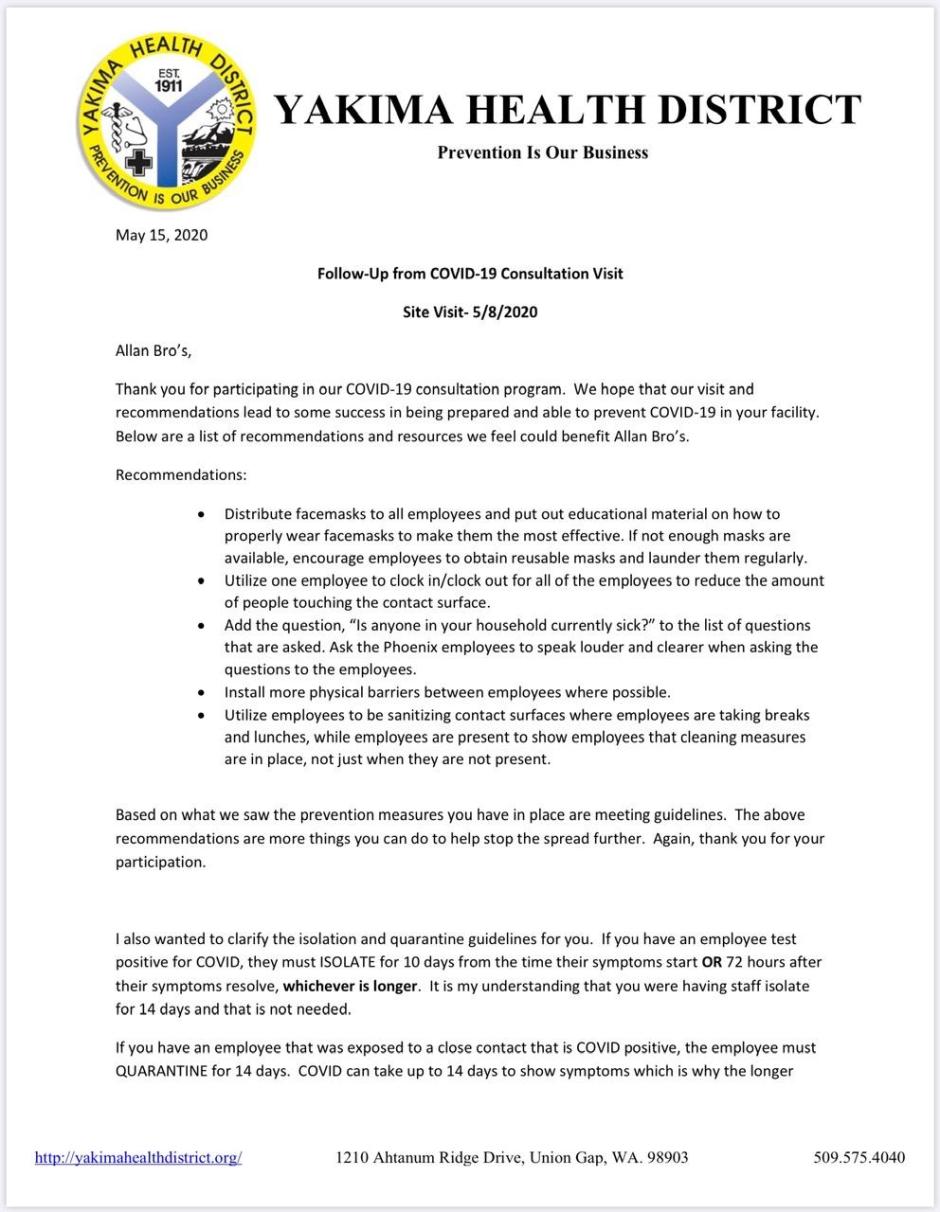
The letter following up on the May 8 consultation visit started off by thanking Allan Bros. for participating in the Health District’s COVID-19 consultation program, and stated that, “We hope that our visit and recommendations lead to some success in being prepared and able to prevent COVID-19 in your facility.”
The letter went on to state, “Based on what we saw the prevention measures you have in place are meeting guidelines.”
However, there were five recommendations listed in the letter that the Health District suggested Allan Bros. could do to help stop further spreading of the coronavirus:
• Distribute facemasks to all employees and put out educational material on how to properly wear facemasks to make them the most effective. If not enough masks are available, encourage employees to obtain reusable masks and launder them regularly.
• Utilize one employee to clock in/clock out for all of the employees to reduce the amount of people touching the contact surface.
• Add the question, “Is anyone in your household currently sick?” to the list of questions that are asked. Ask the Phoenix employees to speak louder and clearer when asking the questions to the employees.
• Install more physical barriers between employees where possible.
• Utilize employees to be sanitizing contact surfaces where employees are taking breaks and lunches, while employees are present to show employees that cleaning measures are in place, not just when they are not present.
The Searchlight Review inquired with the Health District’s Ryan Ibach about the “guidelines” referenced by Magee in his May 15 letter, and asked what the specific guidelines are that the Health District is using for its site visits/consultations with growers and packing houses.
Ibach replied in an email and provided links to three different L&I documents which represented the guidelines being used by the Health District: “Coronavirus (COVID 19) Prevention General Workplace Requirements, Summary”; “Coronavirus (COVID-19) Prevention in Agriculture and Related Industries”; and “Food Processing-Warehouse Coronavirus (COVID-19) Fact Sheet.”
L&I’s Coronavirus (COVID-19) Prevention General Workplace Requirements Summary document lists Mandatory General Requirements for Employers which included: “Cloth face coverings, masks or respirators must be used for work where social distancing is not possible.” The top line of of the 1-page summary document reads: “The Department of Labor & Industries (L&I) requires employers to provide safe and healthy workplaces and to implement the Governor’s order to prevent the spread of the coronavirus.“
L&I’s Coronavirus (COVID-19) Prevention in Agriculture and Related Industries document, and L&I’s Food Processing-Warehouse Coronavirus (COVID-19) Factsheet, both listed mandatory alternate protections for tasks when six-foot spacing is not feasible, which included: “Supply and institute mandatory, commercially-produced facemask policy, such as disposable non-health care use masks. If facemasks are used it must be in combination with physical barriers or some other engineering and/or administrative controls.”
Washington Governor Jay Inslee’s “Safe Start Washington: A Phased Approach to Recovery” plan issued on May 4, 2020, stipulates, among other things, that all employers (in all phases of the recovery plan) are required to:
“Identify personal protective equipment (PPE) and cloth facial coverings in accordance with L&I requirements on facial coverings and industry specific COVID-19 standards. Provide the necessary PPE and supplies to employees.”
As noted earlier in this article, according to the notes document written-up by the Health District’s environmental health specialist after the May 8 site visit/consultation at Allan Bros., the company (at that time) did not have or provide face masks for its workers.
Allan Bros. focuses on strategic technology investments to improve operations and products
In recent years, a major focus for Allan Bros. has been strategic technology investments, according to a 2019 article published by BOSS Magazine. Autumn Bernier, then-chief information officer at Allan Bros., told the magazine, “Miles’ [CEO Miles Kohl] leadership has been the reason why we have excelled the way we have in technology.” Bernier added, “He has been a huge advocate and supporter of the use and advancement in our investments in technology.”
The BOSS Magazine article detailed the many ways that Allan Bros. has invested in and integrated technology to improve its company’s operations and products. In the concluding paragraph of the article, Bernier had said, “We care deeply about the fruit we produce and the experience the customer has.”
It remains to be seen if Allan Bros. can demonstrate that its company cares as deeply about its workers’ health and well-being, as it does about the fruit it produces and the experience its customers have.
